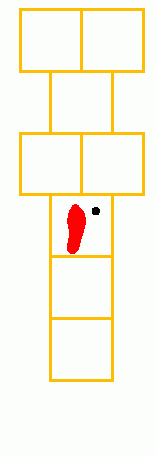This article needs additional citations for verification. (June 2010) |


Hopscotch is a popular playground game in which players toss a small object, called a lagger,[1][2] into numbered triangles or a pattern of rectangles outlined on the ground and then hop or jump through the spaces and retrieve the object.[3] It is a children's game that can be played with several players or alone.[4] Hopscotch is a physical and cognitive workout.[5][6][7]
- ^ Baker, Kate (10 January 2015). "Laggers". Kathleen, Kage and the Company. Retrieved 15 March 2022.
- ^ Gold, David L. (Spring 1981). "Three New-York-Cityisms: Sliding Pond, Potsy, and Akey". American Speech. 56 (1): 17–32. doi:10.2307/454476. JSTOR 454476.
In the 1950s, the game was called hopscotch and the object thrown a lagger /'lagar/. "Lagger" is related to the verb "lag"
[further explanation needed] - ^ "Definition of HOPSCOTCH". Merriam-Webster. Retrieved 15 March 2022.
a child's game in which a player tosses an object (such as a stone) into areas of a figure outlined on the ground and hops through the figure and back to regain the object
- ^ O'Neil Bellomo, Rheanna (2024-05-06). Cilli, Karen (ed.). "Unique Ways to Play Hopscotch With Your Kids". Parents. Retrieved 2024-08-06.
- ^ Mccarthy, Cheryl; Connell, Gill (20 June 2012). "WHY HOPSCOTCH MATTERS". Moving Smart. Retrieved 15 March 2022.
- ^ Welsh, Richard O. (June 2017). "School Hopscotch: A Comprehensive Review of K–12 Student Mobility in the United States". Review of Educational Research. 87 (3): 475–511. doi:10.3102/0034654316672068. S2CID 151488951. Retrieved 15 March 2022.
- ^ Laely, Khusnul; Yudi, Dede (17 December 2018). "The Impact of Hopscotch Game towards the Growth of Kinesthetic Intelligence on 3-4 Year Old Children". Early Childhood Research Journal. 1 (1): 21–28. doi:10.23917/ecrj.v1i1.6581. S2CID 149903485. Retrieved 15 March 2022.